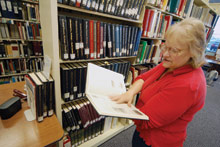The Old Buncombe County Genealogical Society is on the move.
The organization, which specializes in helping people in a modern society find their history, is also working on finding a permanent home. In the meantime, the OBCGS plans to celebrate its recent move from cramped quarters on Tunnel Road to spacious new offices across town on Bingham Road. The public is invited to see the new History and Family Research Center beginning at an open house at 10 a.m. on Saturday, Oct. 25.

It’s a significant move for an organization that began in 1977 on the front porch of a founding member’s home and initially had about 15 books. For the past 15 years, the genealogical society made its home in a small office at the Innsbruck Mall. The group jumped at the chance to move into 5,000 square feet of office space in the former Square D plant on Bingham Road.
“It’s breathing room,” OBCGS President Ruth Dilling says. “We can spread out, and it’s more accessible. But we already know what we have is not big enough.”
The 500-member organization has quietly been working to raise $300,000 in an effort to purchase land and build a permanent home. It has a two-year lease on the Bingham Road space, with an option for a third year, says Pat Dockery, who handles media relations for the genealogical society. The group receives no federal, state or local funding, Dockery says.
Even though it’s not permanent, the group has settled nicely into its new digs. A recent tour with Dockery revealed an impressive collection of computer and paper records sure to excite many a family researcher.
Metal file cabinets stand filled with ancestral file indexes and obituaries clipped from newspapers dating back to the organization’s start. Books on the shelves run the gamut: family histories, records enumerating the enrolled members of the Eastern Band of Cherokee Indians and one work titled, “Genealogical Abstracts of Revolutionary War Pension Files.”
There are oral histories and lectures recorded on cassette tapes, histories of the counties of England, as well as records kept on microfilm. Visitors will also find computerized records to search. (Go to the organization’s Web site, www.obcgs.com, for details.) Researchers come from all over the world to dig into the treasure trove of data, according to Dockery, who notes that it’s all overseen by a staff of dedicated volunteers.
“We specialize in Western North Carolina, but we’re not limited to Western North Carolina,” Dockery says.
And what’s the draw? It’s simple, according to Dilling and Dockery.
“I think we have become so mobile that people are finding a real basic need to find their roots,” Dilling says. “It gives you a feeling of belonging that people need.”


Before you comment
The comments section is here to provide a platform for civil dialogue on the issues we face together as a local community. Xpress is committed to offering this platform for all voices, but when the tone of the discussion gets nasty or strays off topic, we believe many people choose not to participate. Xpress editors are determined to moderate comments to ensure a constructive interchange is maintained. All comments judged not to be in keeping with the spirit of civil discourse will be removed and repeat violators will be banned. See here for our terms of service. Thank you for being part of this effort to promote respectful discussion.